Alan Baxter's Blog, page 73
January 16, 2012
The story's the thing and the meaning of words
I like words. That much is blatantly obvious to anyone who knows me and most who don't. Language, words and stories are the foundation of everything we've become as a cultural animal. Language and words evolve too. You might hate it when people say arks instead of ask, as in, "Can I arks you a question?" To which you reply, "You just did, now go back to fucking school!" But you'd be wrong, kinda. The modern dialectal "ax" is as old as Old English "acsian" and was an accepted literary variant until c.1600. So "arks" is closer to the old version than "ask". Although the word does derive from the Old English "ascian" (not the variant "acsian"), so the correct word has always been "ask" really. Anyway, I'm rambling like an old man on a day trip from the care home. My point is that language evolves and changes.
It can be upsetting sometimes, when we feel like language is dying or being killed off by the uneducated youth of today. But it's not. It's an organic thing, doing what it's always done. After all, you don't call a happy man gay any more. Unless he's happy and likes cock, then it's okay. And you could call him gay even if he was unhappy. Woah, this crazy thing called language!
 So I got to thinking about the nature of storytelling, as that's my thang, and how it's changing. And, by extension, how the language around storytelling is changing. It came up when I was sitting on the couch with my Kindle the other day and my wife called out from the other room, "What are you doing?"
So I got to thinking about the nature of storytelling, as that's my thang, and how it's changing. And, by extension, how the language around storytelling is changing. It came up when I was sitting on the couch with my Kindle the other day and my wife called out from the other room, "What are you doing?"
I panicked and quickly checked that I wasn't up to something, but rallied and replied, "Just reading a book… er, novel."
And it surprised me. I was reading a book. Albeit an ebook. It was a novel. I could as easily have been reading a short story, novella or saved web page on my Kindle. I should have simply replied, "Just reading." But it was out there. I was etymologically stunned for a moment. Why had I corrected myself? I wondered if the word "book" would change in meaning. At what point might it refer only to an actual paper and pages physical book? Would that ever happen? Would we then refer to ebooks by their type – novel, novella, collection and so on?
Let's look at some definitions (all from dictionary.com):
book
noun
1. a written or printed work of fiction or nonfiction, usually on sheets of paper fastened or bound together within covers.
2. a number of sheets of blank or ruled paper bound together for writing, recording business transactions, etc.
3. a division of a literary work, especially one of the larger divisions.
While "a written… work" is primary, the bit "usually on sheets of paper fastened or bound together within covers" is a key part of the definition. It seems that book applies to the artefact as much, if not more than, the content. That's why we specify ebook when we're referring to an electronic copy.
So perhaps it's better, when reading on my Kindle, to say, "I'm reading a novel." I don't think I'll ever say, "I'm reading an ebook", as it seems irrelevant in some way. It's not a papery artefact, so I don't say "book". The fact that it's an ebook does little to impart what I'm actually reading.
 novel
novel
noun
1. a fictitious prose narrative of considerable length and complexity, portraying characters and usually presenting a sequential organization of action and scenes.
(Interestingly – 2. (formerly) novella Origin: 1560–70; < Italian novella (storia) new kind of story. That's evolved now to mean a short novel.)
So that definitely describes better what activity I'm engaged in. Of course, I could say that I'm reading a story.
story
noun
1. a narrative, either true or fictitious, in prose or verse, designed to interest, amuse, or instruct the hearer or reader; tale.
2. a fictitious tale, shorter and less elaborate than a novel.
3. such narratives or tales as a branch of literature: song and story.
4. the plot or succession of incidents of a novel, poem, drama, etc.: The characterizations were good, but the story was weak.
5. a narration of an incident or a series of events or an example of these that is or may be narrated, as an anecdote, joke, etc.
This would work well if I was reading a short story, collection or anthology. But, as you can see from the definition, it doesn't really work linguistically in terms of a novel. It's come to indicate something shorter.
Of course, when reading a short or a novel, we're absolutely enjoying a story. After all, regardless of the delivery system, the story's the thing. That's what we're there for. When it comes to my own work, much as I love the beautiful artefact that is a paper book, all I'm really interested in is people reading my stories, be they short or novel. Read them on paper, ereader, computer screen, whatever. I don't care. You could read them transcribed in felt pen on a hooker's breasts for all I care, as long as you're enjoying the story. And now I have this urge, at some point in my life, to read a story written on a hooker's breasts. Ah well, something else for the bucket list.
So have I solved the conundrum? Actually, no. Because what if I'm reading a non-fiction work on my Kindle. It's an ebook, so not a book in the artefect sense. But it's not a novel either. Maybe I could then say, "I'm reading a book about literature on hookers' breasts in the early twenty first century."
My wife would come stumbling into the room saying, "What!? I haven't seen a book like that lying around."
To which I heft my Kindle and say, "It's an ebook." *sigh*
Language. It's a funny old thing.
.
January 14, 2012
A little bit of bookshelf porn
We moved into our house about three and a half years ago and one of the things we sorely lacked was bookshelf space. Let's be honest, there's never enough. Unless you're Neil Gaiman – seriously, have you seen that guy's library? Here, check it out. Fuck, eh? Still, when I'm as successful as Mr Gaiman, I'll have a library like that too. In the meantime, I'll struggle on.
Anyway, we finally decided enough was enough and, with the Xmas generosity of some family members, we got some new bookshelves and at last managed to unpack some boxes. There are still a few more boxes to go, but we've broken the back of it for now. We have several other bookshelves around the house, but we now have this major feature in the front room:

The unit on the left is just over six feet tall. If you can make out any titles, don't judge my cataloguing. It's completely unsorted at the moment. The important thing was to get the books out of boxes and onto shelves. Next step is to sort them into some kind of order. That includes moving stuff around from the other shelves in the house and finally bringing order to our books.
Notice the top left two cubes in the picture above? That's my brag shelf, where all my books, or books and magazines containing my work, live. If only there was a way to somehow represent all the digital publishing on the brag shelf, as there's a fair bit of published stuff that will never see a meatspace shelf any more. But that's the way of the future. Maybe I should allocate some space on the brag shelf to an iPad, with all my online work bookmarked like a little digital library. Or maybe not.
Mmmmbooks…
.
January 12, 2012
Meme – The Nobel Prize for Literature
I pinched this off Ian Sales blog. You know me, I love a good literary meme. This one is very high-brow – all the Nobel Prize for Literature winners since 1901. The rules are the same as usual: bold if you've read anything by the author, italicise if it's on the To Be Read pile. Given the high-brow nature of this list, I'm not expecting much of a result on my part. (Truth be told, I don't think I've even heard of most of these names.)
2011 Tomas Tranströmer
2010 Mario Vargas Llosa
2009 Herta Müller
2008 Jean-Marie Gustave Le Clézio
2007 Doris Lessing
2006 Orhan Pamuk
2005 Harold Pinter
2004 Elfriede Jelinek
2003 John M Coetzee
2002 Imre Kertész
2001 Sir Vidiadhar Surajprasad Naipaul
2000 Gao Xingjian
1999 Günter Grass
1998 José Saramago
1997 Dario Fo
1996 Wislawa Szymborska
1995 Seamus Heaney
1994 Kenzaburo Oe
1993 Toni Morrison
1992 Derek Walcott
1991 Nadine Gordimer
1990 Octavio Paz
1989 Camilo José Cela
1988 Naguib Mahfouz
1987 Joseph Brodsky
1986 Wole Soyinka
1985 Claude Simon
1984 Jaroslav Seifert
1983 William Golding
1982 Gabriel García Márquez
1981 Elias Canetti
1980 Czeslaw Milosz
1979 Odysseus Elytis
1978 Isaac Bashevis Singer
1977 Vicente Aleixandre
1976 Saul Bellow
1975 Eugenio Montale
1974 Eyvind Johnson, Harry Martinson
1973 Patrick White
1972 Heinrich Böll
1971 Pablo Neruda
1970 Aleksandr Isayevich Solzhenitsyn
1969 Samuel Beckett
1968 Yasunari Kawabata
1967 Miguel Angel Asturias
1966 Shmuel Yosef Agnon, Nelly Sachs
1965 Mikhail Aleksandrovich Sholokhov
1964 Jean-Paul Sartre
1963 Giorgos Seferis
1962 John Steinbeck
1961 Ivo Andric
1960 Saint-John Perse
1959 Salvatore Quasimodo
1958 Boris Leonidovich Pasternak
1957 Albert Camus
1956 Juan Ramón Jiménez
1955 Halldór Kiljan Laxness
1954 Ernest Hemingway
1953 Sir Winston Leonard Spencer Churchill
1952 François Mauriac
1951 Pär Fabian Lagerkvist
1950 Earl (Bertrand Arthur William) Russell
1949 William Faulkner
1948 Thomas Stearns Eliot
1947 André Paul Guillaume Gide
1946 Hermann Hesse
1945 Gabriela Mistral
1944 Johannes Vilhelm Jensen
1943 No Nobel Prize was awarded this year.
1942 No Nobel Prize was awarded this year.
1941 No Nobel Prize was awarded this year.
1940 No Nobel Prize was awarded this year.
1939 Frans Eemil Sillanpää
1938 Pearl Buck
1937 Roger Martin du Gard
1936 Eugene Gladstone O'Neill
1935 No Nobel Prize was awarded this year.
1934 Luigi Pirandello
1933 Ivan Alekseyevich Bunin
1932 John Galsworthy
1931 Erik Axel Karlfeldt
1930 Sinclair Lewis
1929 Thomas Mann
1928 Sigrid Undset
1927 Henri Bergson
1926 Grazia Deledda
1925 George Bernard Shaw
1924 Wladyslaw Stanislaw Reymont
1923 William Butler Yeats
1922 Jacinto Benavente
1921 Anatole France
1920 Knut Pedersen Hamsun
1919 Carl Friedrich Georg Spitteler
1918 No Nobel Prize was awarded this year.
1917 Karl Adolph Gjellerup, Henrik Pontoppidan
1916 Carl Gustaf Verner von Heidenstam
1915 Romain Rolland
1914 No Nobel Prize was awarded this year.
1913 Rabindranath Tagore
1912 Gerhart Johann Robert Hauptmann
1911 Count Maurice (Mooris) Polidore Marie Bernhard Maeterlinck
1910 Paul Johann Ludwig Heyse
1909 Selma Ottilia Lovisa Lagerlöf
1908 Rudolf Christoph Eucken
1907 Rudyard Kipling
1906 Giosuè Carducci
1905 Henryk Sienkiewicz
1904 Frédéric Mistral, José Echegaray y Eizaguirre
1903 Bjørnstjerne Martinus Bjørnson
1902 Christian Matthias Theodor Mommsen
1901 Sully Prudhomme
Well, there you go – a round dozen. Out of 110 (actually, something like 104, as there were some years where no award was given.) I'm surprised I was able to bold that many. How about you? How many did you get?
.
January 11, 2012
Beautiful book shop stop-motion animation
I found this via Neil Gaiman's Twitter feed (@neilhimself). He said:
People kept sending me this YouTube stop motion bookstore video, and finally I watched it. Now in love.
And I have to agree with him. It's just beautiful and it must have taken an incredible amount of time. If you watch the section with a clock in view, two hours pass just for that short sequence. And, while I'm a big fan and proponent of digital publishing, I do also agree with the final sentiment of the film (read the cover of the last book).
Enjoy.
.
January 10, 2012
Tuesday Toot – Chuck McKenzie
(Tuesday Toot on a Wednesday? Yeah. Wanna fight about it? It's still Tuesday in America, so blow me. I'm still catching up from holidays.)
Tuesday Toot is a new invite-only series of short posts where writers, editors, booksellers and other creatives have been asked to share thier stuff and toot their own horn. It's hard to be seen in the digital morass and hopefully this semi-regular segment will help some of the quality stuff out there get noticed. It should all be stuff that readers of The Word will find edifying.
Today, it's Chuck McKenzie.
Who is Chuck?
Chuck McKenzie was born in 1970, and still spends much of his time there. Since 1999 he's had over two dozen short stories published, along with a novel (Worlds Apart, Hybrid Publishers, 1999) and a collection of his short SF and horror fiction (Confessions of a Pod Person, MirrorDanse Books, 2005), and has co-edited an anthology of humourous genre tales (AustrAlien Absurdities, Agog! Press, 2003). More recently, he worked as a staff reviewer for HorrorScope, before setting up the affiliated zombie review site NecroScope. Chuck's work has received multiple nominations for the Aurealis, Ditmar and Australian Shadows awards, while Chuck himself has sat on the judging panels for both the Aurealis and Australian Shadows awards on several occasions.
What are you tooting about?
Currently, Chuck is in the process of setting up a bookshop in Chelsea, Victoria, which will specialise in SF, fantasy and horror, as well as graphic novels, Manga, roleplaying supplies, and esoteric titles. Additionally, major shelf space will be dedicated to Australian small-press fiction. The shop has a planned opening date of February 2012, and Chuck (pre)invites one and all to drop in and enjoy the genuine staff knowledge and old-fashioned service that will form the foundation of this business. Details available soon!
The shop will be at Shop 9, Chelsea Beach Arcade, 426 Nepean Highway, Chelsea, VIC.
[We need more independent, specialist book stores, especially for genre fiction, so good on ya, Chuck! I hope it's a storming success and I look forward to coming down for a signing sometime soon. - Alan]
.
January 9, 2012
Holiday reading
We've just enjoyed a week away in the Snowy Mountains (which is why it's been a bit quiet around here lately, my apologies.) One of the best things for me about holidays is the unfettered reading time, so I thought I'd share with you all what I've been reading over the Xmas/New Year break and our recent week off.
Firstly, there were a couple of contributor copies of things I have work in that I hadn't got around to yet. Apart from the obvious joy of getting published and sharing a Table Of Contents with some seriously talented other writers, having a story in a publication usually (and should!) means that I get a copy of said publication. Free reading material – one of life's highest pleasures.
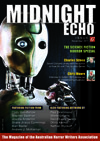 Midnight Echo 6 – I've mentioned this a few times recently, so I won't bore you again. Suffice to say that it is a bloody brilliant issue of the magazine, and I don't say that only because I have a story in it. The standout story for me was Joanne Anderton's Out Hunting For Teeth. But every story is great and there's extra interviews and all sorts of stuff. This is the sci-fi horror special and you'd think that might make for saminess. (Yes, that's word, so get fucked.) But it doesn't. There's a great variety here and as the issue also includes the winners of the AHWA Flash and Short Story competitions, there's a couple of non-sci-fi horror stories too. Great bang for your buck.
Midnight Echo 6 – I've mentioned this a few times recently, so I won't bore you again. Suffice to say that it is a bloody brilliant issue of the magazine, and I don't say that only because I have a story in it. The standout story for me was Joanne Anderton's Out Hunting For Teeth. But every story is great and there's extra interviews and all sorts of stuff. This is the sci-fi horror special and you'd think that might make for saminess. (Yes, that's word, so get fucked.) But it doesn't. There's a great variety here and as the issue also includes the winners of the AHWA Flash and Short Story competitions, there's a couple of non-sci-fi horror stories too. Great bang for your buck.
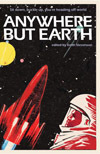 Anywhere But Earth – This is another contrib copy for me, as it features my story, Unexpected Launch. However, mine is only one of 29 stories in this 728 page epic tome of a sci-fi anthology. I think this book will go down as a must-read in modern science fiction. The scope of the stories and the talent of the contributing authors is astounding. It really is a fantastic array of ideas and style. If you're a sci-fi fan, you'll dig this book. If you're not, it's a great place to start. And if you know someone who says they don't like sci-fi and you want to try to convert them, buy them this book. There were a handful of stories that didn't really work for me, but that's the case with any anthology. And this one has 29 stories, so there's definitely something for everyone and I would bet that the majority of people would really groove with the majority of stories in here. Probably the standouts for me were Penelope Love's SIBO, William R D Wood's Deuteronomy, Robert Hood's Desert Madonna, Damon Shaw's Continuity, Brendan Duffy's Space Girl Blues, Angela Ambroz's Pyaar Kiya and Steve Cameron's So Sad, The Lighthouse Keeper. Although the real star of that last story is a secondary character. In fact, a brick.
Anywhere But Earth – This is another contrib copy for me, as it features my story, Unexpected Launch. However, mine is only one of 29 stories in this 728 page epic tome of a sci-fi anthology. I think this book will go down as a must-read in modern science fiction. The scope of the stories and the talent of the contributing authors is astounding. It really is a fantastic array of ideas and style. If you're a sci-fi fan, you'll dig this book. If you're not, it's a great place to start. And if you know someone who says they don't like sci-fi and you want to try to convert them, buy them this book. There were a handful of stories that didn't really work for me, but that's the case with any anthology. And this one has 29 stories, so there's definitely something for everyone and I would bet that the majority of people would really groove with the majority of stories in here. Probably the standouts for me were Penelope Love's SIBO, William R D Wood's Deuteronomy, Robert Hood's Desert Madonna, Damon Shaw's Continuity, Brendan Duffy's Space Girl Blues, Angela Ambroz's Pyaar Kiya and Steve Cameron's So Sad, The Lighthouse Keeper. Although the real star of that last story is a secondary character. In fact, a brick.
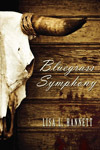 Blue Grass Symphony – This is the debut collection from Canadian-born Australian writer Lisa L Hannett. It's an outstanding achievement. A selection of tales of magic, darkness, intrigue, mystery. Hannett's style is clear throughout, even though the stories cover very different ground. There's a brilliant vampire story here that's worth the cover price alone. Seriously, if you thought vampire stories had been done to death, buy this book and read From the Teeth of Strange Children. There isn't a bad story in this book and it's a superbly dark and twisted exploration of life in mythical Blue Grass towns and counties. Great characters, great stories. Lisa is a friend of mine, but this isn't just mate's favours. I can't recommend this book highly enough.
Blue Grass Symphony – This is the debut collection from Canadian-born Australian writer Lisa L Hannett. It's an outstanding achievement. A selection of tales of magic, darkness, intrigue, mystery. Hannett's style is clear throughout, even though the stories cover very different ground. There's a brilliant vampire story here that's worth the cover price alone. Seriously, if you thought vampire stories had been done to death, buy this book and read From the Teeth of Strange Children. There isn't a bad story in this book and it's a superbly dark and twisted exploration of life in mythical Blue Grass towns and counties. Great characters, great stories. Lisa is a friend of mine, but this isn't just mate's favours. I can't recommend this book highly enough.
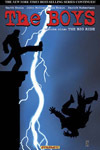 The Boys, Vol. 9: The Big Ride – Garth Ennis is one of my favourite writers and I've been loving this series. The Boys is about a world where superheroes exist and they're a bunch of dangerous, narcissistic prima donnas and The Boys exist to keep them in line. If you like your graphic novels to be powerful, irreverant, digusting, offensive, thought-provoking and just downright fucking brilliant, you should read The Boys. In fact, you should read everything by Ennis. And volume 9 knocked me sideways. The end of the book just takes your guts and wrenches them out. Stunning. And for the comic book nerds out there, check out the cover and think about The Dark Knight Returns. Classic.
The Boys, Vol. 9: The Big Ride – Garth Ennis is one of my favourite writers and I've been loving this series. The Boys is about a world where superheroes exist and they're a bunch of dangerous, narcissistic prima donnas and The Boys exist to keep them in line. If you like your graphic novels to be powerful, irreverant, digusting, offensive, thought-provoking and just downright fucking brilliant, you should read The Boys. In fact, you should read everything by Ennis. And volume 9 knocked me sideways. The end of the book just takes your guts and wrenches them out. Stunning. And for the comic book nerds out there, check out the cover and think about The Dark Knight Returns. Classic.
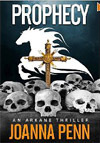 Prophecy by Joanna Penn. You may remember I was talking about Joanna Penn's first book, Pentecost, a while back. This is the new one, a sequel and the next ARKANE thriller. It's a short book, around 65,000 words I think, and rocks along nicely. It's a religious thriller, with a kick-arse female protagonist called Morgan Sierra. Sierra is a bit like a female James Bond/Jason Bourne/Indiana Jones hybrid. In this book she's in a race against time to unravel a mystery before a powerful international health and wellbeing company can destroy a quarter of the world in accordance with the prophecy of the Four Horsemen. Penn's ability as a writer is improving and her characters are developing well. There's clearly going to be a series of ARKANE books (the next one is touted at the end of this one) and I think they make for great reading. Penn has a degree in theology and her knowledge and research, of ideas and locations, really shines through in these stories. In some ways I preferred the story in the first book, but I loved the ideas in this one. There's nothing world-changing here, but as rollicking thrillers these books are great – perfect for holiday reading.
Prophecy by Joanna Penn. You may remember I was talking about Joanna Penn's first book, Pentecost, a while back. This is the new one, a sequel and the next ARKANE thriller. It's a short book, around 65,000 words I think, and rocks along nicely. It's a religious thriller, with a kick-arse female protagonist called Morgan Sierra. Sierra is a bit like a female James Bond/Jason Bourne/Indiana Jones hybrid. In this book she's in a race against time to unravel a mystery before a powerful international health and wellbeing company can destroy a quarter of the world in accordance with the prophecy of the Four Horsemen. Penn's ability as a writer is improving and her characters are developing well. There's clearly going to be a series of ARKANE books (the next one is touted at the end of this one) and I think they make for great reading. Penn has a degree in theology and her knowledge and research, of ideas and locations, really shines through in these stories. In some ways I preferred the story in the first book, but I loved the ideas in this one. There's nothing world-changing here, but as rollicking thrillers these books are great – perfect for holiday reading.
So that was my recent word consumption. I'll also post these comments on Goodreads and Amazon. Remember, folks, we're the gatekeepers now. If you read things and enjoy them, talk about them – blog, post reviews at online stores, tell your friends and families. As authors, we'll love you for it.
So what about you? Did you read any great books over the end of year break?
.
January 2, 2012
Tuesday Toot – Kyla Ward
Tuesday Toot is an invite-only series of short posts where writers, editors, booksellers and other creatives have been asked to share thier stuff and toot their own horn. It's hard to be seen in the digital morass and hopefully this semi-regular segment will help some of the quality stuff out there to get noticed. It should all be stuff that readers of The Word will find edifying.
Today, it's Kyla Ward.
Who is Kyla?
Kyla Ward is a Sydney-based creative who works in many modes. Her latest release is The Land of Bad Dreams, a collection of dark and fantastic poetry. Her novel Prismatic (co-authored as Edwina Grey) won an Aurealis Award for Best Horror. Her short fiction has appeared in Ticonderoga Online, Shadowed Realms, Borderlands, Gothic.net and in the Macabre anthology, amongst others. Her work on RPGs including Buffy the Vampire Slayer saw her appear as a guest at the inaugural Gencon Australia. Her short film, 'Bad Reception', screened at the 3rd international Vampire Film Festival and she is a member of the Theatre of Blood repertory company, which has also produced her work. In addition, she programmed the horror stream for the 2010 Worldcon. A practicing occultist, she likes raptors, swordplay and the Hellfire Club.To see some very strange things, try http://www.tabula-rasa.info
What are you tooting about?
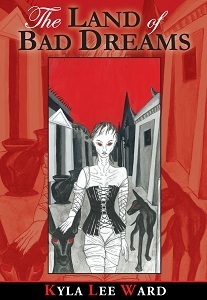 "The Land of Bad Dreams" is my new collection of dark poetry from P'rea Press. Described as "a rich, eccentric miscellany of dark music, skilfully crafted and strangely wrought." by Ann. K. Schwader and "Nocturnal, toothy, grisly and witty … a carnival of life's cruel and grotesque side," by K. J. Bishop, this handsome volume represents three decades of work and many of my obsessions. Expect warriors, magicians and torturers, vampiric beauties and indescribable monsters – and that's just in the videos! What waits between the pages is stranger and more sinister by far. "Virgins and Martyrs", "The Torturer's Confession" and the urban gothic epic, "The Feast of Mistrust", will show you how far you may travel in your sleep, and just how bad a dream can be, while still remaining a dream.
"The Land of Bad Dreams" is my new collection of dark poetry from P'rea Press. Described as "a rich, eccentric miscellany of dark music, skilfully crafted and strangely wrought." by Ann. K. Schwader and "Nocturnal, toothy, grisly and witty … a carnival of life's cruel and grotesque side," by K. J. Bishop, this handsome volume represents three decades of work and many of my obsessions. Expect warriors, magicians and torturers, vampiric beauties and indescribable monsters – and that's just in the videos! What waits between the pages is stranger and more sinister by far. "Virgins and Martyrs", "The Torturer's Confession" and the urban gothic epic, "The Feast of Mistrust", will show you how far you may travel in your sleep, and just how bad a dream can be, while still remaining a dream.
After spending over two thousand years as the premier form for expressing anything, poetry these days is somewhat underrated. Between nursery rhymes on one hand and English classes on the other, many people seem to think it has no real place in the world. Which is ridiculous – if you aren't blinded by the addition of a couple of guitars and a scowling singer, poetry today is ubiquitous! Poe himself said, "Music, when combined with a pleasurable idea, is poetry." So from a certain perspective, this isn't just my latest book, it's my first album!
That's why I went and shot video clips. Inviting six Sydney performance groups – including Venus Vamp, the Surgical Sideshow and the Swordplay School of Theatrical Fencing – to interpret poems from the collection, I filmed the lot with three cameras and a live, to say nervous audience. The results, magnificently put together by Jon Blum, are free to view on the book's web page. I tell you, it's an education!
[NB - Kyla just informed me right before posting that this collection has made the Stoker Recommended Reading list. Congrats to Kyla for that great achievement! - Alan]
December 22, 2011
Midnight Echo 6 touches down on Earth
CHeck it out – here's me with my contributor's copy of Midnight Echo, # 6, featuring my sci-fi/horror yarn, Trawling The Void.
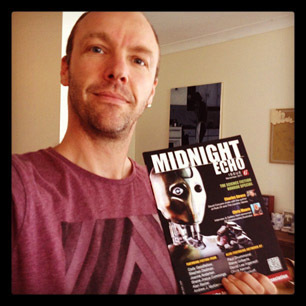
Below is the full ToC – go get your copy now!
"Earthworms" by Cody Goodfellow
"Trawling the Void" by Alan Baxter
"Out Hunting For Teeth" by Joanne Anderton
"Graveyard Orbit" by Shane Jiraiya Cummings
"Surgeon Scalpelfingers" by Helen Stubbs
"Silver-Clean" by Jenny Blackford
"The Wanderer in the Darkness" by Andrew J McKiernan
"Winds of Nzambi" by David Conyers & David Kernot
"Duncan Checks Out" by Nicholas Stella
"Dead Low" by Cat Sparks
"More Matter, Less Art" by Stephen Dedman
"Seeds" by Mark Farrugia
The issue features an in depth interview with Charles Stross, one of the most imaginative and insightful science fiction authors writing today. Stross has been honoured with two Hugo awards and Locus Reader awards, and has published more than a dozen novels, including Saturn's Children and The Fuller Memorandum. He talks to David Conyers for Midnight Echo about his Lovecrafitan science fiction horror series, The Laundry, and his latest novel, Rule 34.
A second interview is with Chris Moore, world renowned British science fiction artist best known for his striking covers for Orion Publishing's SF Masterworks series. Insights are gained into Moore's process for achieving his striking and imaginative art, and the many changes he has been facing in the publishing industry since he began illustrating in the 1970s.
The cover for Midnight Echo 6, 'Strange Behaviour', is a creation of talented UK artist, Paul Drummond, who will be well-known to readers of Interzone and Jupiter for his striking depictions of star ships, futuristic humans and robots. Featured interior illustrators include Steve Gilberts, David Lee Ingersoll, Olivia Kernot and Nathan Wyckoff.
Midnight Echo 6: The Science Fiction Horror Special, has been edited by South Australian trio, David Kernot (editor of Andromeda Spaceways Inflight Magazine), Jason Fischer (Writers of the Future winner and Aurealis nominee), and David Conyers (author of The Eye of Infinity, The Spiraling Worm and co-editor of Cthulhu Unbound 3).
.
December 21, 2011
Spectral Press – limited edition ghostly chapbooks
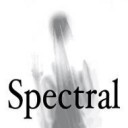 Spectral Press is a small independent imprint publisher, issuing very-limited-edition signed and numbered single story chapbooks in a high-quality presentation on a quarterly basis, and concentrating on the ghostly/supernatural end of the literary spectrum. They're an invite-only publisher and they're putting out some fantastic work.
Spectral Press is a small independent imprint publisher, issuing very-limited-edition signed and numbered single story chapbooks in a high-quality presentation on a quarterly basis, and concentrating on the ghostly/supernatural end of the literary spectrum. They're an invite-only publisher and they're putting out some fantastic work.
I was lucky enough to see the first four chapbooks published so far.
Spectral I – What They Hear in the Dark – Gary McMahon
An absence is more terrifying than a presence…
Rob and Becky bought the old place after the death of their son, to repair and renovate – to patch things up and make the building habitable. They both knew that they were trying to fix more than
the house, but the cracks in their marriage could not be papered over. Then they found the Quiet Room.
This is an excellent tale of loss and grief and the damage it can do to people. McMahon has created such a depth of bleakness and melancholy that it takes you down into the black depths of the character's lives and it's not an entirely pleasant place to be. But it is excellent writing and compelling storytelling.
There are some truly horrible ideas in this one, not least the hoods themselves, which I won't spoil here. The Quiet Room as well is a brilliant device, something so simple yet so ethereal.
Spectral II – Abolisher of Roses – Gary Fry
It's not always the guilty who have the darkest secrets . . .
Peter has been married to Patricia for nearly thirty years. He's a practical man, the owner of a thriving factory and the father of two fine lads.
He also has a secret mistress.
One day, his wife takes him along to an outdoor arts exhibition involving some of her paintings, staged in a dark, deep wood. But his are not the only secrets in this marriage, and as Peter strays off the only path through the woods, he soon realises that Patricia has more than a few of her own…
In this story Fry creates a kind of artistic warning that's extremely well contructed. We go on a journey of self-discovery with Peter in this excellently written piece. What seems initially to be a very harmless and possibly boring environment, certainly to the protagonist, turns out to be anything but. Very creepy.
The characters are strong in this story and in no way the kind of stereotypes it would have been easy for the author to fall into. It's details like these that set apart truly quality writing from the merely good.
Spectral III – Nowhere Hall – Cate Gardner
We want to live…
In the ballroom, wallflower mannequins stretch their fingers towards Ron. He can't ask them to dance. He's already waltzing with other ghosts. Someone stole the world while Ron contemplated death. They packed it in a briefcase and dumped him in the halls of the ruined hotel – The Vestibule.
A nowhere place.
This is a beautiful story, haunting and powerful. It's superbly written, with rich, stirring language and an excellent sense of place. It's one of those stories where you think you know all along what's happening, but even at the end you're left wondering if you got it at all. It bears reading and re-reading, to savour the idea as much as the exquisite writing.
In fact, it's the kind of writing that makes other writers, like myself, shake our heads at the sheer levels of artistry involved. Inspirational and aspirational stuff. Absolutely top notch.
Spectral IV – King Death – Paul Finch
In 1348, England is stricken by the Black Death.
The worst pandemic in human history has reached the kingdom of the warlike Edward III, a monarch who in battle against human adversaries cannot imagine defeat. Two thirds of his subjects now perish. Woods become wild again, farmland goes to rack and ruin, villages, towns and castles are left empty, inhabited only by ghosts. Little wonder that fear of the supernatural reaches an all-time high. Little wonder stories ignite about witches and demons spreading the plague, about 'King Death', an awesome harbinger
of doom from whom there is no protection.
Cynical opportunist Rodric doesn't believe any of these. With reckless indifference, he sets out to enrich himself…
Unlike the previous three stories, all contemporary settings, this is a medieval story, historically accurate. It's told in fine language, evocative of the time – so much so that a glossary is provided at the end to explain some of the terminology.
It's another brilliant piece of writing, and a dark and hypnotic story of opportunity and bleakness. The protagonist here is an excellent creation, an antihero of sorts who we can probably all relate to. It's difficult to see where human evil and the sheer horror of nature blur one into the other with this story.
***
Editor and publisher Simon Marshall-Jones can certainly pick a damn fine tale and he's putting together something very special here. Definitely a publisher to watch – keep an eye out so you don't miss any.
Forthcoming titles are:
Spectral V Rough Music – Simon Kurt Unsworth (March 2012 – SOLD OUT)
Spectral VI The Eyes of Water – Alison J. Littlewood (June 2012)
Spectral VII What Gets Left Behind – Mark West (September 2012)
Spectral VIII Title TBC – Wayne Simmons (December 2012)
Spectral IX Creakers (provisional title) – Paul Kane (March 2013)
Spectral X Cold Havens – Simon Bestwick (June 2013)
Spectral XI Soul Masque – Terry Grimwood (September 2013)
Spectral XII Title TBC – Thana Niveau (December 2013)
Spectral XIII Title TBC – Robert Shearman (March 2014)
Spectral XIV Home and Hearth – Angela Slatter (June 2014)
.
December 20, 2011
Tuesday Toot – Jason Fischer
Tuesday Toot is a new feature here at The Word. It's a semi-regular, invite-only series of short posts where writers, editors, booksellers and other creatives have been asked to share thier stuff and toot their own horn. It's hard to be seen in the digital morass and hopefully this occasional segment will help some of the quality stuff out there to get noticed. It should all be stuff that readers of The Word will find edifying.
Today, with the inaugural Tuesday Toot, it's Jason Fischer.
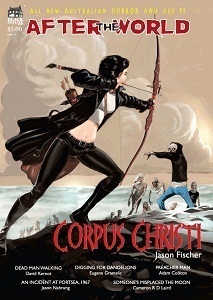 Who is Jason?
Who is Jason?
Jason attended the Clarion South writers workshop in 2007, and has been shortlisted in the Aurealis Awards, the Ditmar Awards, and the Australian Shadows Awards. He won the 2009 AHWA Short Story and the 2010 AHWA Flash Fiction Competitions, and is a recent Winner of the Writers of the Future contest. Jason has stories in Dreaming Again, Apex, Andromeda Spaceways Inflight Magazine, and Aurealis Magazine. He has written a series of zombie-apocalypse novellas in the After The World series (available from Black House Comics), and his fantasy novel, Tusk, is soon to be serialised in Terra Magazine.
What are you tooting about?
Corpus Christi (novella now available in After the World #4). Immediately following the events of After the World: Gravesend, Corpus Christi brings the reader straight back into the action. Led by Tamsyn, dead-eyed archer and troubled soul, the survivors of Gravesend have escaped from England on an old cargo ship. Following a mysterious radio message across the Atlantic, they find the promise of a cure for the zombie virus is not all its cracked up to be. It's a terrifying new America, and if Tamsyn and her friends want a place to call home, they're going to have to fight for it…
Jason's website is http://jasonfischer.com.au
After The World #4 can be purchased online via: http://www.blackboox.net/after-the-world-corpus-christi-issue-4
The official After the World website is: http://aftertheworld.com.au/
And for those who want a free taste, Jason's first novella, Gravesend, is now available online and gratis: http://aftertheworld.com.au/?page_id=18
.



